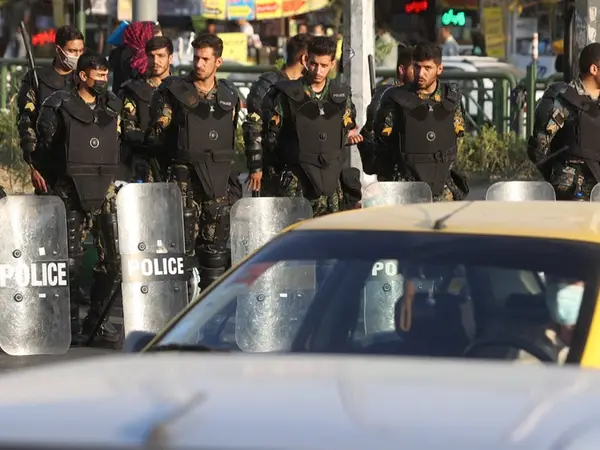Security measures in Iran have been heightened in anticipation of the anniversary of Mahsa Amini's death, as activists and civic groups have called for mass rallies.
Iran International sources report that regime agents have set up nighttime checkpoints amid a significant buildup of security forces in city centers.
These measures include enhanced protection for government buildings, a substantial increase in law enforcement personnel, and plainclothes motorcycle patrols, according to eyewitness accounts.
The regime has also erected numerous banners in major city centers warning citizens of severe penalties for dress code violations, seemingly as a deliberate effort to instill fear and discourage potential protests.
Last year's brutal crackdown by the regime during the protests following Amini's death, resulted in the deaths of over 500 civilians, with thousands more sustaining injuries and tens of thousands imprisoned.
Despite the intensified intimidation campaign, several calls for protests and strikes have been issued online by major dissident figures and groups. In a joint statement, eight labor and civil organizations reaffirmed their commitment to keeping the revolutionary movement ignited by the death of Mahsa Jina Amini in police custody. They called upon the people to take to the streets, launch strikes, and hold gatherings on her death anniversary on September 16.
The group of eight organization referred to the anniversary protests as an opportunity for a "fresh start" in the course of the revolutionary movement, stating, "With the strength of our struggle, we will turn the anniversary of the Women, Life, Freedom movement into our annual public holiday."
The signatories of the statement include the Council for Organizing Contract Workers' Protests in the Oil Industry, the Association of Electricity and Metalworkers in Kermanshah, the Follow-up Committee for Workers' Associations, and the Independent Voice of Steel Workers.
A few days after a call for action by Iran's exiled prince Reza Pahlavi, who has become a leading opposition figure in the current wave of protests, exiled Queen Farah Pahlavi seconded the call for Iranians to unite against the regime.
The queen also urged Iran's security and military forces not to stand against the people and protect the lives of protesters against the regime's suppression apparatus. Pahlavi hailed Mahsa Amini as a symbol for all those who over the past 44 years have strived to weaken religious tyranny and redress the setbacks inflicted on the country by the Islamic Republic, stating, "This shared pain is our commitment to achieving a common cure."
Calls for national rallies on the anniversary of protests have rekindled the "Woman, Life, Freedom" movement, which also embodies popular anger against poverty and various forms of discrimination, particularly gender-based and sexual discrimination, for over four decades.
For several months, the Supreme National Security Council has convened various meetings to prepare for potential public protests on the anniversary of the people's uprising. These meetings have led to the detention of family members of activists and political figures. However, the regime has yet to officially disclose the exact number of detainees, their charges, detention locations, or the authorities responsible for the detentions.
Nevertheless, according to the Human Rights Organization Hengaw, at least 70 family members of detainees, including nine children under the age of 18, have been arrested in various cities since the beginning of this year (March 22).
Based on information obtained by Iran International, security entities have also summoned some participants of last year's protests and are harassing the families of dead protesters to discourage them from partaking in protests.
These individuals have been pressured to remain in their homes during the week that coincides with September 16. Intelligence agencies have issued warnings that engagement in "any kind of activity in the virtual or public space" during the period will result in detention.
